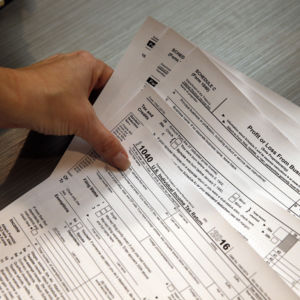Small business owners could risk losing a deduction on their taxes unless they get their estimated fourth quarter state taxes done by the end of the year.
Businesses and individuals typically pay taxes by withholding the amount due on income earned. But small businesses and self-employed individuals that don’t withhold can instead pay an estimated tax on a quarterly basis. The estimated tax for states can be deducted later on federal taxes – but that could soon be eliminated.
Congressional Republicans are advancing legislation aimed at overhauling the tax code – including the elimination of those deductions. They hope to implement the plan at the start of next year. Mario Pizzamiglio, a certified public accountant at 6Accounting, notes that deduction will still count if people get their estimated fourth quarter state taxes done before the legislation becomes effective.
“The fourth quarter state estimated tax payment is usually something that’s not due until January 15th of the following year,” Pizzamiglio told InsideSources. “It’s included as an estimated payment on the 2017 state return, but it’s not included as an itemized deduction until the 2018 federal tax return.”
The House and Senate passed versions of the legislation that both eliminate what are known as state and local tax deductions – with the exceptions of property taxes which are capped at $10,000. Both chambers are now working to resolve differences between their bills but it looks likely that aspect will remain in place to some degree.
Pizzamiglio first flagged his clients on the issue in an email Dec. 4. It all comes down to what the current law is when the estimated taxes are paid – so doing them before the legislation goes into effect would mean the deduction would still be counted when filing federal taxes for 2018.
“Essentially what’s happening is people will lose their ability to deduct their fourth-quarter payment on their federal tax returns because of a two week time period,” Pizzamiglio said. “So, my email to my clients is basically, if you’re one of my clients who makes these payments, make it before the end of the year so that there’s no ambiguity.”
Pizzamiglio adds there really isn’t a downside because even if the legislation isn’t enacted in time, it just means the estimated taxes were done early. But waiting until the deadline opens up the risk of losing that deduction – since the tax code could be reformed by that point.
Taxpayers don’t need to make their fourth quarter federal taxes until the deadline on Jan. 15, as the new law would not affect these payments or the ability to deduct.
“I was just trying to be conservative and err on the side of caution for my clients,” Pizzamiglio said. “Let’s just get it in there and we’ll deal with the tax reform when it actually becomes law. But since we know that both the House and Senate have included at least a portion of this is their respective versions, it’s safe to assume this is going to make it’s way into the final, one way or another, and let’s not potentially lose a deduction for really no reason.”
The Internal Revenue Service imposes a penalty when the estimated taxes are incorrect – but since determining the liability can be difficult there are a couple caveats. A penalty won’t be imposed if the estimated tax payment is based on the amount paid in the previous year, or is within 90 percent of the actual liability. The difference is made up when final taxes are paid.

